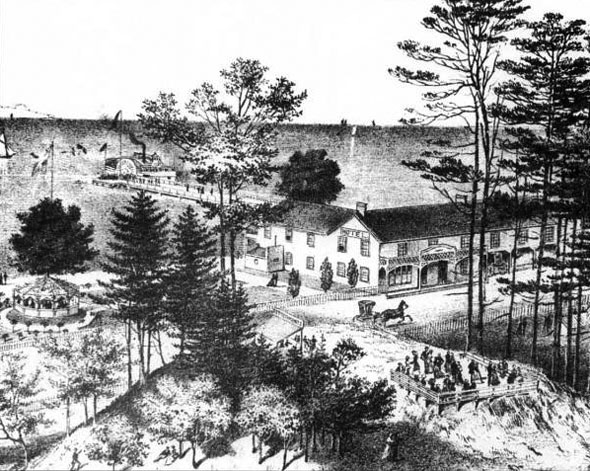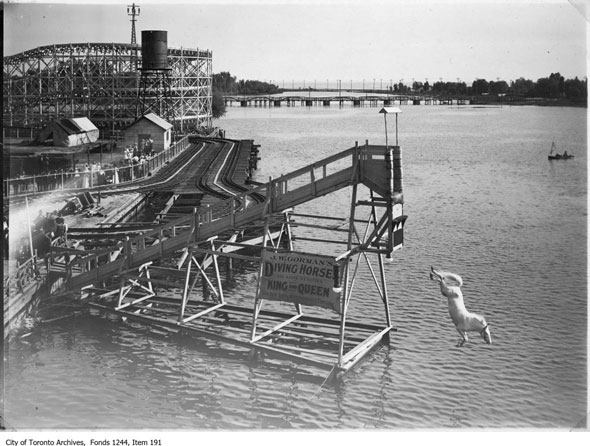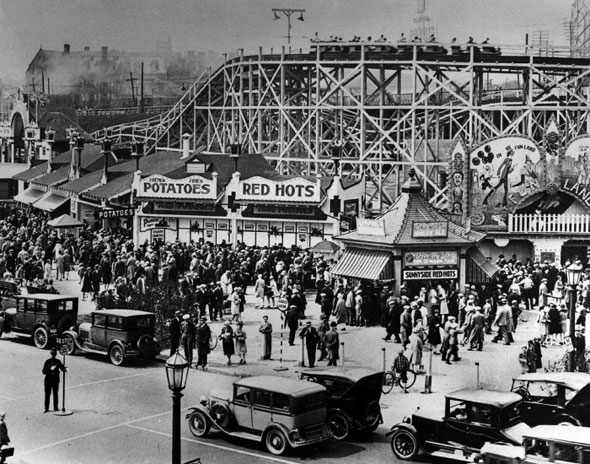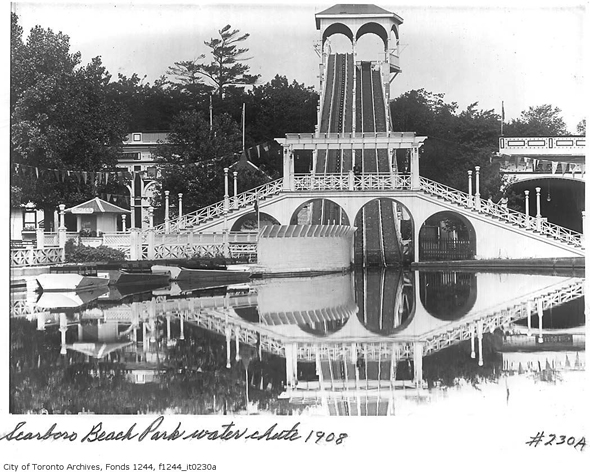
The lost amusement parks of Toronto
There is something incredibly nostalgic about black-and-white photos of amusement parks from the 1900s. Wooden rollercoasters, hand-painted rides, delighted faces taking a dizzying ride on the Whip, eating red hots, or splashing down a log flume. Everyone dressed up for occasion--no shorts or flip-flops in sight no matter how hot it might have been.
In the heyday of waterfront amusement parks, Hanlan's Point was Toronto's Coney Island and Sunnyside its Blackpool Beach. As tastes changed and Torontonians found their kicks elsewhere, the city's parks fell on hard times and one by one disappeared, often leaving no trace of their existence save for a few dusty archival photographs.
Here is a roundup of five lost amusement parks we wish had stuck around.
CROW'S BEACH

The mouth of the Humber River, in the 1870s some distance away from the central city, provided the location for some of Toronto's earliest amusements. Crow's Beach on the old Lake Shore Road was a cluster of hotels en route to Hamilton and Niagara that became an attraction in its own right.
According to Mike Filey in I Remember Sunnyside: The Rise & Fall of a Magical Era, a hotel run by John Duck called Wimbleton House featured a dancehall, bicycle track, a fishpond, a small zoo, swings, and a merry-go-round. Duck died in 1891, leaving the business to his widow, Catherine Crow, who continued until 1912 when a fire finished off the attractions for good.
The waterfront site was later occupied by the Palace Pier, an off-shore dancehall that the owners had hoped would feature ice skating, dancing, games of chance, a theatre, and shops.
HANLAN'S POINT

Today, the ferry dock at Hanlan's Point betrays little of what used to await disembarking passengers. From the late 1880s into the 1920s, the western tip of the Toronto Island was home to a wild amusement park packed with rides like dodgems, rollercoasters, swings, and even dubious attractions such as diving horses and a freak show--"the great and only museum of living curiosities."
The popular summer attraction spawned from Hanlan's Hotel, a large accommodation built by champion sculler Edward Hanlan, the son of the early settler for whom the area is named. A large athletic field at the northern part of the point was where a young Babe Ruth hit his first professional home run in 1914.
Hanlan's, faced with competition from mainland attractions like Sunnyside, went into decline in the 1920s before vanishing entirely. Today, the Toronto Island airport and the ferry dock occupy the former site.
SUNNYSIDE

In its heyday, Sunnyside amusement park was the most popular pleasure park in the city. Opened in 1922 on a strip of sandy artificial waterfront near King, Queen, and Roncesvalles, its rides included the Aero Swing, a merry-go-round, bumper cars, a whip, and a lightning-fast wooden rollercoaster called the Sunnyside Flyer, which was capable of reaching a terrifying 90 km/h.
Later, the TTC offered free streetcar rides to the park's massive pool--nicknamed "The Tank"--such was the popularity of the giant bathing area.
Sunnyside died a slow death: visitors declined as cars allowed potential visitors to reach more exotic locations and construction of the Gardiner Expressway required the demolition of several of its principal buildings in the 1950s. Metro Chairman Fred Gardiner wasn't a fan of preserving the park. "We can't have this honky-tonk at the main entrance to the city on both sides of the main expressway. It should be completely cleared away," he said. The park closed for good in the late 1950s after a series of fires, though some of it assets, like the Gus Ryder Outdoor Pool, still survive.
VICTORIA PARK
An altogether more sedate proposition than its rivals, Victoria Park specialized in sedate pastimes and bucolic scenery. Starting in 1878, downtown ferries began arriving at the foot of the city avenue that still bears the park's name, lured by the promise of dancing, waterfront strolls, a small zoo, and gentle rides on a steam-powered carousel.
Other attractions included donkey rides, a scenic lover's walk, bicycle races, ascensions in tethered gas balloons, and tightrope-walking displays. Victoria Park was bought out in 1899 and later served as a camp ground and outdoor school. The city bought the land in 1927 and later used it as the location for the R. C. Harris Water Treatment Plant.
SCARBOROUGH BEACH

The fourth of the major Toronto amusement parks from the halcyon days of the early 1900s, Scarborough Beach Amusement Park was located on the south side of Queen Street, a few blocks east of Kew Gardens.
Though not remembered as fondly as Hanlan's or Sunnyside, Scarborough Beach did brisk trade thanks to its excellent streetcar connections. The main attraction was a roughly 20 to 30 metre log flume called "Shoot the Chutes" that plunged riders into a pool of water, a "Whirl of Pleasure," a wooden rollercoaster, and something called "The Tickler," tagline: "It's a scream from start to finish."
The park, operated in later years by the Toronto Railway Company, a private streetcar company, closed in 1925 when TRC became part of the Toronto Transit Commission and the latter balked at maintaining the attraction. The land was sold to property developers and is now home to several streets, one of which is named after the park and is built on top of its former driveway.
Chris Bateman is a staff writer at blogTO. Follow him on Twitter at @chrisbateman.
Images: City of Toronto Archives
Latest Videos
Latest Videos
Join the conversation Load comments







